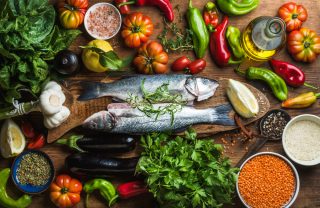Inflammation: you may not feel this process in your body, but believe us, it’s definitely leaving an impact.
Now inflammation is meant to help the body, too much of a good thing is never actually good, and before you know it, you’re trying to control something that went from helping your body to harming your health.
What does inflammation do to the body?
Inflammation occurs when the body’s immune cells enter the blood or tissues in order to protect the body from invaders. The problem starts when these inflammatory responses start focusing on healthy tissues, organs, and cells.
This action not only causes potential organ and tissue damage, but also increases the risk for diseases such as heart disease, cancer, diabetes as well as chronic pain, and asthma.
How can I reduce the risk of chronic inflammation?
1. Embrace an anti-inflammatory diet
One of the best ways to combat inflammation is by eating the right anti-inflammatory foods. If you’re not sure where to start, then we suggest taking notes from the Mediterranean diet.

Foxys Forest Manufacture/Shutterstock
According to a study published in the Nutrition Journal earlier this year, the Mediterranean diet was associated with lower inflammatory markers.
The Mediterranean diet plays a strong focus on fresh fruits and vegetables as well as fish and whole grains. The nutrients found in this diet, particularly omega-3 fatty acids, and various antioxidants, may be exactly what you need to combat inflammation.
2. Avoid inflammatory foods
Some foods can hurt inflammation, and others can help it.
Common inflammatory foods include anything processed and high in both sugar and fat. Red meat is also inflammatory, so you might want to switch to plant-based meats.
Diary has also been found to trigger inflammation, so aside from plant-based milk, you can always try kefir, which is a great dairy alternative that’s bursting with probiotics.
3. Stay active
Honestly, this is the best way to stay healthy, and it’s also a surefire way to reduce inflammation.

Photo by Minna Hamalainen on Unsplash
A review set out to examine the effects of aerobic exercise on inflammation in the bodies of healthy middle-aged and older adults. The findings, published in Frontiers in Aging Neuroscience, found that aerobic exercise significantly reduced inflammatory markers.
If you’re not much of a fitness fiend, you can still stay active by walking, dancing, and even completing household chores.
4. Stress less
Yes, this can be hard to do – especially during a pandemic – but research has found that acute and chronic stress is associated with increased inflammatory activity (1).
Finding simple and easy ways to relieve stress – such as practicing yoga, meditating, gardening, or even listening to your favorite song – won’t only benefit your mental health, but it can also provide effective anti-inflammatory effects.
5. Sleep better
Getting enough quality sleep is important for your health and any disruption is sure to trigger inflammation. It also doesn’t help that when you’re sleep-deprived, you engage in inflammatory behavior like snacking on highly processed foods (2).
That said, we should also point out that there is such a thing as ‘too much sleep’. Not only can oversleeping affect cognitive health, but it might also trigger inflammation.
As such, it’s important to get at least seven to nine hours of sleep and stick to your sleep schedule – even on weekends.

Photo by Ryan Parker on Unsplash
6. Step back from the liquor
This should surprise no one, but alcohol is an inflammatory substance, and cutting back on it can help to address inflammation in the body. Therefore, you’ll be better off cutting your daily glass of red wine to once a week.
7. Sip on green tea
Green tea is packed with antioxidants, that not only help to protect the body from oxidative stress but can also effectively combat inflammation. According to one study, green tea extract helped to produce anti-inflammatory responses, so you may want to switch out your morning coffee for a cup of green tea.
Want to know more?
Inflammation can trigger a lot of diseases, including ones that affect the brain. As we know, men are from Mars, and women are from Venus. However, are these differences why women are more vulnerable to brain diseases and disorders than men?
References
Hagiu, A., Attin, T., Schmidlin, P.R. et al. (2020). Dose-dependent green tea effect on decrease of inflammation in human oral gingival epithelial keratinocytes: in vitro study. Clin Oral Invest 24, 2375–2383. https://doi.org/10.1007/s00784-019-03096-4
Hart, M.J., Torres, S.J., McNaughton, S.A. et al. (2021). Dietary patterns and associations with biomarkers of inflammation in adults: a systematic review of observational studies. Nutr J 20, 24. https://doi.org/10.1186/s12937-021-00674-9
Maydych V. (2019). The Interplay Between Stress, Inflammation, and Emotional Attention: Relevance for Depression. Frontiers in neuroscience, 13, 384. https://doi.org/10.3389/fnins.2019.00384
Zheng, G., Qiu, P., Xia, R., Lin, H., et al (2019). Effect of Aerobic Exercise on Inflammatory Markers in Healthy Middle-Aged and Older Adults: A Systematic Review and Meta-Analysis of Randomized Controlled Trials. Frontiers in aging neuroscience, 11, 98. https://doi.org/10.3389/fnagi.2019.00098



![women [longevity live]](https://longevitylive.com/wp-content/uploads/2020/01/photo-of-women-walking-down-the-street-1116984-100x100.jpg)










